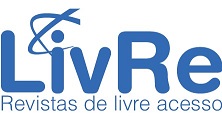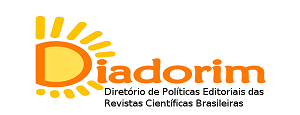DECOLONIALIDADE, MODERNIDADE E CULTURA DOS COMUNS
reflexões sobre a questão ambiental no currículo do novo ensino médio no estado do Tocantins
DOI:
https://doi.org/10.70860/rtg.v13i30.17758Palavras-chave:
Currículo, Decolonialidade, Modernidade, Questão ambiental, Cultura dos comunsResumo
Neste artigo discutimos as dinâmicas sociais contemporâneas no debate sobre Estado, sociedade e natureza, reconhecendo as abordagens da temática ambiental e sua materialidade sob a égide do capital globalizado imbricadas na reformulação do currículo do Novo Ensino Médio. Com o objetivo de compreender a questão ambiental, como instrumento de ação sociopolítica e territorial, identificando os elementos da colonialidade global, procedemos com análises nos documentos curriculares de nível nacional e estadual, levantamento de ações nos Projetos Pedagógicos de 2020 a 2023, nos relatórios do Colégio Estadual Adolfo Bezerra de Menezes, em Araguaína, norte do Tocantins. Identificamos que o modelo proposto invisibiliza as vivências, práticas epistemológicas e cosmovisões, que estão assentes numa Cultura do Comum, tão necessárias para compreensão da realidade amazônica e do território do Tocantins, as narrativas desenvolvimentistas, que estrategicamente diluem as práticas curriculares a partir de ações superficiais de cunho pragmático pontual. Em contrapartida, entendemos pela perspectiva decolonial, a possibilidade de trilhar outras vias epistemológicas e conectar os saberes de forma interdisciplinar.
Referências
ACSELRAD, Henri. Justiça ambiental e construção social do risco. Desenvolvimento e Meio Ambiente. n.5. p.49-60.jan./jun.2002.Disponível: https://revistas.ufpr.br/made/article/view/22116/14480 Acesso em: 15 abr 2023. DOI: https://doi.org/10.5380/dma.v5i0.22116
AGUIAR, Vinicius Gomes de et al. Tecnologias sociais no território comum: Articulação institucional e inclusão social no Quilombo grotão. Revista ABPN, v. 12, n. Ed. Especial – Caderno Temático: “Geografias Negras” ,abril de 2020, p. 336-360. DOI: https://doi.org/10.31418/2177-2770.2020.v12.c1.p336-360
AGUIAR, Vinicius Gomes de, RAMOS JÚNIOR, Dernival Venancio, COSTA, Kenia Gonçalves.Conflito ambiental na Comunidade Ilha Verde : articulação institucional e ativismo cartográfico. Revista Ateliê Geográfico, Goiânia-GO, v. 15, n. 2, ago/2021, p. 162– 185. DOI: https://doi.org/10.5216/ag.v15i2.66094
AIRES, J. PEREIRA; SOUSA, E. S. Educação Ambiental em Santa Fé do Araguaia -TO: Entre o querer, o poder e o fazer. In: Pelos Caminhos da Geografia.1 ed.Goiânia: Kelps, 2022, p. 71-79.
BRASIL, André de Oliveira Moura. Educação ambiental na prática docente: desafios da interdisciplinariedade em uma escola de Ensino Médio em Araguaína. Dissertação – Universidade Federal do Tocantins, Programa de Pós-graduação em ensino de Ciências e Matemática,Araguaína,2022.Disponível: <https://repositorio.uft.edu.br/handle/11612/4366> Acesso em: 23 de junho de 2023.
BRASIL. Ministério da Educação. Exposição de motivos º00084/2016/MEC.Brasília, 2016.
BRASIL. Base Nacional Comum Curricular: Ensino Médio. Brasília: MEC/Secretaria de Educação Básica, 2018.
BRASIL. Constituição da República Federativa do Brasil. Brasília, 1988.
BRASIL. Lei n. 9.394, de 20 de dezembro de 1996. Estabelece as diretrizes e bases da educação nacional. Diário Oficial da União, Brasília, 23 de dezembro de 1996.
BRASIL.Lei n.º 13.415 de 2017.Disponível
:<http://www.planalto.gov.br/ccivil_03/_ato2015-2018/2017/lei/L13415.htm> Acesso em: 15 de feverereiro de 2022.
BRASIL. Medida Provisória nº 746, de 22 set. 2016. Institui a Política de Fomento à Implementação de Escolas de Ensino Médio em Tempo Integral.Diário Oficial da União, Brasília, 2016.Disponível:<http://www.planalto.gov.br/ccivil_03/_ato2015- 2018/2016/mpv/mpv746.htm>.Acesso:23 de jun 2023.
BRASIL, Portaria nº 521, de 13 de julho de 2021. Institui o Cronograma Nacional de Implementação do Novo Ensino Médio. Disponível: <https://www.gov.br/mec/pt-br/novo- ensino-medio/marco-legal> Acesso em: 15 de feverereiro de 2022.
BRASIL. Resolução CNE/CEB 3/2018. Diário Oficial da União, Brasília, 22 de novembro de2018. Disponível:<http://portal.mec.gov.br> Acesso em: 20 fev.2022.
COLÉGIO ESTADUAL ADOLFO BEZERRA DE MENEZES, Projeto Político Pedagógico - PPP, Araguaína, 2020.
COLÉGIO ESTADUAL ADOLFO BEZERRA DE MENEZES, Projeto Político Pedagógico - PPP, Araguaína, 2021.
COLÉGIO ESTADUAL ADOLFO BEZERRA DE MENEZES, Projeto Político Pedagógico - PPP, Araguaína, 2023.
DESIDERIO, P. M. M. ; SOUSA, I. L. ;NAKASHIMA, R. H. R.. As Epistemologias do Sul
como possibilidade de re(existência)da universidade pública brasileira. Revista Cocar(online), v. 15, p. 1-20, 2021.
DINIZ, Vanessa Lessio; MOURA, Osmar Oliveira de . Interlocuções sobre currículo e a implementação da BNCC de Geografia: Buscando pedagogias decoloniais para o contexto amazônico.Revista E-Curriculum (PUCSP) , v. 18, p. 1668-1690, 2020. DOI: https://doi.org/10.23925/1809-3876.2020v18i4p1668-1690
GABRIEL, C. T.Currículo e construção de um comum: Articulações insurgentes em uma política institucional de formação docente. Revista e-Curriculum, São Paulo, v.17, n.4, p. 1545-1565 out./dez. 2019 DOI: https://doi.org/10.23925/1809-3876.2019v17i4p1545-1565
GIL, A. C. Como elaborar projetos de pesquisa. São Paulo, SP: Atlas, 2002
JACOMINI, Marcia Aparecida; Novo Ensino Médio na prática; a implementação da reforma na maior rede de ensino básico do país. In: Revista Retratos da Escola - Escola de Formação da Confederação Nacional dos Trabalhadores em Educação (Esforce). Dossiê: A implementação do Novo Ensino Médio nos Estados, Brasília: v. 16, n. 35, maio/agosto de 2022, p. (267-284). DOI: https://doi.org/10.22420/rde.v16i35.1569
LAVAL, Christian. A escola não é uma empresa: o neoliberalismo em ataque ao ensinopúblico . Tradução: Mariana Echalar. Londrina : Editora Planta, 2004.
LAVAL, Christian; DARDOT, Pierre. O Comum: um ensaio sobre revolução no século 21.
Tradução Renan Porto. Revista Lugar Comum – Estudos de mídia, cultura e democracia, 2017. Disponível em: https://revistas.ufrj.br/index.php/lc/article/view/49475. Acesso: 09 de outubro de 2023
LAYRARGUES, P.P.;LIMA, G.F. da C. Mapeando as macro-tendências político- pedagógicas da Educação Ambiental contemporânea no Brasil. Anais do VI Encontro “Pesquisa em Educação Ambiental”. Ribeirão Preto: USP. 2011.
MALDONADO-TORRES, Nelson. Sobre la colonialidad del ser: contribuciones al desarrollode um concepto. In: CASTRO-GÓMEZ, Santiago; GROSFOGUEL, Ramón (Orgs.). El giro decolonial: Reflexiones para una diversidad epistémica más allá del capitalismo global.Bogotá, 2007. p. 127-167.
MILAGRES, C. S. F.; FRA, M. M. P.; ARIAS, A. I. G.; RODRIGUES, W. A resiliência comunitária como alternativa para o desenvolvimento regional em face das transformações socioecológicas nas comunidades tradicionais jalapoeiras, Tocantins. Desenvolvimento e Meio Ambiente, v. 59, p.182-205, jan./jun. 2022. Disponível: https://revistas.ufpr.br/made/article/view/75460/46425. DOI: https://doi.org/10.5380/dma.v59i0.75460
OLIVEIRA, D. D. de; RIBEIRO, A.C. C.; ANDRADE, C. C. F. Levantamento de concepções, abordagens e vertentes em Educação Ambiental com professores de uma unidade escolar do Ensino Médio. Revista Educação Pública, v. 21, nº 37, 5 de outubro de2021. Disponível: https://educacaopublica.cecierj.edu.br/artigos/21/37/levantamento-de-concepcoes- abordagens-e-vertentes-em-educacao-ambiental-com-professores-de-uma- unidade-escolar-do- ensino-medio. Acesso em: 25 de jun. 2023
PARENTE, T. G. Desenvolvimento regional na perspectiva de gênero. Projeto História, São Paulo, n. 45, pp. 269-284, Dez. 2012.
RAMOS JR., D. V. Desencobrir o sul, desfetichizar o pensamento. RevistaEntreLetras, Araguaína, v. 11, n. 2, p. 103-121, 2020. DOI: https://doi.org/10.20873/uft.2179-3948.2020v11n2p102
RAMOS, D. V. et all. Geopolítica das Usinas Hidrelétricas, Lutas por re-existência e Pedagogias da colonialidade na Amazônia do Tempo Presente. História do tempo presente na Amazônia. Vol. 3. Boa Vista: Editora da UFRR, 2020, pp. 263-286. (https://www.researchgate.net/publication/342064313_Geopolitica_das_Usinas_Hidreletricas_Lutas_ por_re-existencia_e_Pedagogias_da_colonialidade_na_Amazonia_do_Tempo_Presente)
Downloads
Publicado
Como Citar
Edição
Seção
Licença
Copyright (c) 2024 Revista Tocantinense de Geografia

Este trabalho está licenciado sob uma licença Creative Commons Attribution-NonCommercial-NoDerivatives 4.0 International License.
A Revista Tocantinense de Geografia não remunera nenhum autor pela publicação de seus textos. Os conteúdos dos textos publicados neste periódico são de responsabilidade de seus autores.








.png)












